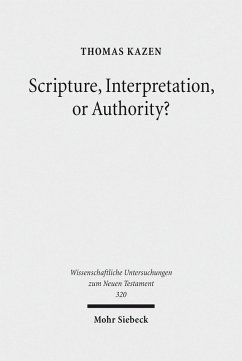In this study of motives and arguments in Jesus' halakic conflicts, Thomas Kazen suggests a way out of the present methodological impasse in the use of traditional criteria of authenticity in historical Jesus research, at least when it comes to those Jesus traditions that relate to halakic issues. Kazen employs results from recent research on the development of halakah during the Second Temple period, in particular from Aharon Shemesh's discussion of two models (developmental and reflective) for explaining halakic development within and between various Jewish movements, and three areas of tension for analyzing dissenting views (revelation vs. interpretation, Scripture vs. tradition, and nominalism vs. realism). Kazen revisits the Synoptic conflict narratives about Sabbath observance, purity rules and divorce practices, and discusses motives and arguments ascribed to Jesus, whether implicitly or explicitly, by the texts themselves, or by modern interpreters. By combining analyses of halakic development with tradition and redaction criticism, Kazen disentangles theological motives from reasonable historical explanations and suggests relative dates and contexts for motives and arguments often ascribed to Jesus. He questions interpretations which focus on unique individual or halakic authority and suggests that the earliest Jesus tradition appeals to the priority of human need and to creational intent, viewing revelation as based on plain reading and a realistic understanding of Scripture. Jesus' stance is best explained within the framework of prophetic criticism and a traditional Israelite understanding of Torah. With this work the author contributes as much to our understanding of halakic development during the Second Temple and Tannitic periods as he does to our understanding of the historical Jesus and his relationship to contemporary movements. Born 1960; since 1990 Minister in the Uniting Church in Sweden (previously Swedish Covenant Church); 2002 ThD in New Testament Exegesis (Uppsala); since 2010 Professor in Biblical Studies at Stockholm School of Theology.
Dieser Download kann aus rechtlichen Gründen nur mit Rechnungsadresse in A, B, BG, CY, CZ, D, DK, EW, E, FIN, F, GR, HR, H, IRL, I, LT, L, LR, M, NL, PL, P, R, S, SLO, SK ausgeliefert werden.


